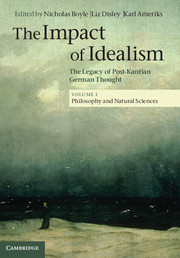Book contents
- Frontmatter
- Contents
- List of Illustrations
- List of Contributors
- Acknowledgements
- List of Abbreviations
- Foreword
- General introduction: the eighteenth and nineteenth centuries
- General introduction: the twentieth and twenty-first centuries
- Introduction: Idealism in the natural sciences and philosophy
- 1 Philosophy of natural science in Idealism and neo-Kantianism
- 2 The impact of German Idealism and Romanticism on biology in the nineteenth century
- 3 The unconscious: transcendental origins, Idealist metaphysics and psychoanalytic metapsychology
- 4 Nietzsche, Kant and teleology
- 5 Transcendental idealism, phenomenology and the metaphysics of intentionality
- 6 Heidegger and the impact of idealism
- 7 French Hegelianism and anti-Hegelianism in the 1960s: Hyppolite, Foucault and Deleuze
- 8 Scottish Idealism
- 9 ‘My station and its duties’: social-role accounts of obligation in Green and Bradley
- 10 Idealism and the origins of analytic philosophy1
- 11 Idealism and Pragmatism: the inheritance of Hegel's concept of experience
- 12 Reason's form
- Bibliography
- Index
- References
Introduction: Idealism in the natural sciences and philosophy
Published online by Cambridge University Press: 05 December 2013
- Frontmatter
- Contents
- List of Illustrations
- List of Contributors
- Acknowledgements
- List of Abbreviations
- Foreword
- General introduction: the eighteenth and nineteenth centuries
- General introduction: the twentieth and twenty-first centuries
- Introduction: Idealism in the natural sciences and philosophy
- 1 Philosophy of natural science in Idealism and neo-Kantianism
- 2 The impact of German Idealism and Romanticism on biology in the nineteenth century
- 3 The unconscious: transcendental origins, Idealist metaphysics and psychoanalytic metapsychology
- 4 Nietzsche, Kant and teleology
- 5 Transcendental idealism, phenomenology and the metaphysics of intentionality
- 6 Heidegger and the impact of idealism
- 7 French Hegelianism and anti-Hegelianism in the 1960s: Hyppolite, Foucault and Deleuze
- 8 Scottish Idealism
- 9 ‘My station and its duties’: social-role accounts of obligation in Green and Bradley
- 10 Idealism and the origins of analytic philosophy1
- 11 Idealism and Pragmatism: the inheritance of Hegel's concept of experience
- 12 Reason's form
- Bibliography
- Index
- References
Summary
The very nature of German Idealism militates against sharply separating the many different fields in which it has had an immense impact. For obvious practical reasons, however, the essays in this volume on philosophy restrict themselves as much as is feasible to relatively pure and foundational issues, and so they refrain from directly engaging the more concrete social, aesthetic and religious topics that are treated in the other volumes of The Impact of Idealism. In addition, the essays that focus on science restrict themselves to the legacy of Idealist philosophy in a few of the most significant developments of recent centuries, and they do not attempt to review all the sciences in which Idealism has been influential. Each of the essays shows how a core philosophical notion is illuminated by a number of different writers, and typically in a way that reveals how the basic ideas of some important recent discussions can be understood as a reaction to a sequence of thought that goes back to more than one of the original Idealists.
Science and Idealism
In his review of developments in the mathematical and physical sciences Michael Friedman reconstructs the twists and turns by which Kant's notion of an a priori framework of constitutive and regulative principles led to Hermann Cohen's and Ernst Cassirer's neo-Kantian model of science as a ‘converging sequence of conceptual structures’ aimed at the construction of a ‘universal invariant theory of experience’. A major step in this development was Hermann von Helmholtz's call to return to the spirit of Kant's work by moving beyond the letter of a merely Euclidian and Newtonian conception of space and physical objects and towards a broader theory of the universal forces of attraction and repulsion. Friedman argues that this step was anticipated by Schelling's Naturphilosophie, which played an important catalytic role in early nineteenth-century science by indicating how the notion of opposing fundamental forces could be fruitfully expanded to the domain of electro-chemistry.
- Type
- Chapter
- Information
- The Impact of IdealismThe Legacy of Post-Kantian German Thought, pp. 62 - 71Publisher: Cambridge University PressPrint publication year: 2013



